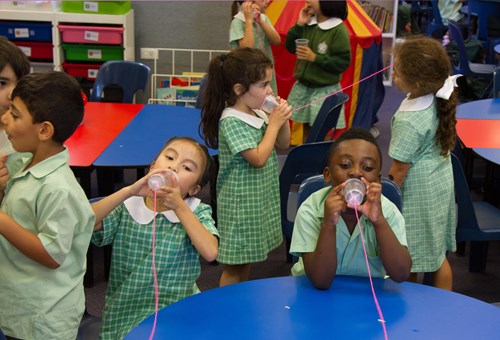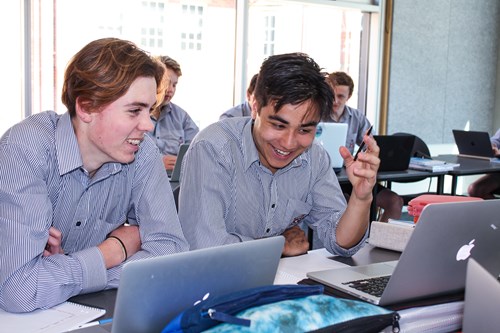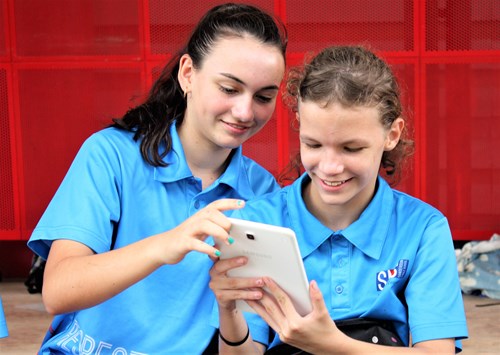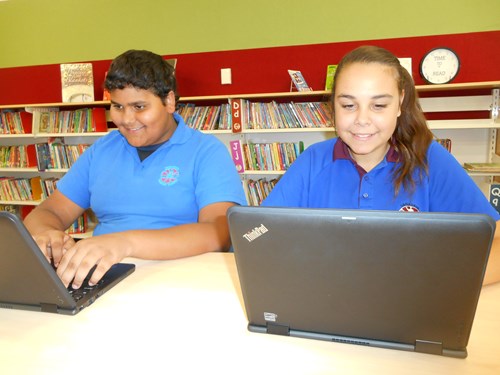State and territory authorities and sectors continue to implement the English curriculum with an increasing number of teachers using the National Literacy progression in conjunction with the curriculum. The English work sample portfolio has been reviewed for coverage of the achievement standards and the currency of some of the samples. ACARA will commence work on collection of new work samples for all year levels (F-10) of the English curriculum to provide a more current and expansive representation of the curriculum. ACARA acknowledges the contribution South Australian Independent schools have already made to this process.
State and territory authorities continue to be supported in their implementation of the Australian Curriculum: HPE. This year Natalie Jonas joined ACARA as the new Curriculum Specialist HPE, based in SA. ACARA’s relationship with The Australian Council for Health, Physical Education and Recreation (ACHPER) continues to grow. We are currently exploring possibilities about how we can collaborate further to enhance the wellbeing and physical health of young Australians and provide advice and support for teachers on the implementation of the Australian Curriculum: HPE.
State and territory authorities and sectors continue to be supported in their implementation of the Australian Curriculum: HASS in F-6/7 and the 7-10 Australian Curriculum in History, Geography, Economics and Business, and Civics and Citizenship. Collection, development and annotation of work samples in 7-10 Economics and Business and in F-6/7 HASS has continued, with publication scheduled for the second half of this year, and the existing work sample portfolios in History and Geography are under review. Particular support has been given to stakeholders in the ACT in embedding the general capabilities into HASS programming and units of work.
This year Kirsty Jeffree joined ACARA as the new Curriculum Specialist Languages, based in SA. The publication of work samples for the first phase languages: Chinese, French, Indonesian, Italian and Japanese, is underway, with work samples published progressively on the Resources pages from June this year. Indonesian work sample portfolios are now live on the ACARA Curriculum website. Planning is underway for the collection of work samples for the second phase languages: Arabic, German, Modern Greek, Spanish and Vietnamese. The first 2-day workshop to support this collection was held with teachers from South Australian schools in June this year. We are planning additional work samples workshops for the phase 2 Languages, to be held later this year.
This year Rachael Whitney-Smith joined ACARA as the new Curriculum Specialist Mathematics, based in Perth WA. The existing work samples are being reviewed and ACARA is planning the collection of new work samples to provide a more current and expansive representation of the curriculum, including samples that exemplify the proficiency strands.
As part of the program of research to inform the next iteration of the AC, ACARA is participating in curriculum design projects as part of the OECD E2030 framework and investigating approaches specific to curriculum redesign in Mathematics. This has involved working with Charles Fadel and the Center for Curriculum Redesign (CCR), and with the OECD’s E2030 project in a Mathematics Curriculum Document Analysis (MCDA) exercise. The MCDA exercise is exploring the correlation between curriculum documents, resources and support materials in the light of the revised 2021 PISA Mathematical Literacy Assessment Framework.
ACARA has developed 95 new elaborations for the Aboriginal and Torres Strait Islander Histories and Cultures cross-curriculum priority in the Australian Curriculum: Science (F-10). Over coming months, in collaboration with state and territory colleagues, information sessions will be held in various locations across the country. These sessions will include representatives from Aboriginal and Torres Strait Island community groups as well as government, independent and catholic education sectors, universities and other organisations with a focus on science education. Following the information sessions ACARA will publish the new elaborations in Science later in the year, along with teacher information material.
ACARA’s Digital Technologies in focus curriculum officers are now working in 160 schools across Australia. We welcomed schools from the ACT into the project and now have all states and territories represented. Action research projects are progressing, and project focus clusters are starting to meet to discuss common interests. Four professional learning workshops have been accredited with NESA in NSW and are being implemented with project schools and with schools in the local area of project schools. Professional learning events are advertised on the Digital Technologies Hub.
ACARA’s Curriculum Specialists for Technologies and the General Capabilities, and members of the Assessment and Reporting team hosted a 2-day forum with state, territory and jurisdictional representatives and tertiary stakeholders to explore directions for the NAP ICT-Literacy assessment in 2020. Thinking from the forum will inform the development of the 2020 assessment framework.
This year Helen Champion joined ACARA as the new Curriculum Specialist The Arts, based in Melbourne. Since starting in May, Helen has connected with a number of Arts educators and advocates in relation to development of 7-10 Arts support material, to be published as part of the National Literacy and Numeracy Progressions resource and is looking to further the relationships with Arts organisations and educators.
State and territory educational authorities continue to be supported in their implementation of this key dimension of the Australian Curriculum. Throughout 2018 ACARA has provided support through collaborative workshops and presentations across jurisdictions in South Australia, the ACT and New South Wales.
The quarterly newsletter, Primary Matters, has provided examples of the different approaches schools are taking to embedding the General Capabilities into practice in a primary setting. The next issue of Primary Matters will have a focus on Science and the General Capabilities. Through collaboration with the Australian Science Teachers Association (ASTA) and states and territories, schools have been invited to share innovative practices embedding science inquiry skills with the general capabilities in primary years F-6/7.
Work samples and illustrations of practice are being developed for the Critical and Creative Thinking and Personal and Social capabilities. These provide examples of approaches that embed the general capabilities into the learning experiences of students within the context of the content and skills of each learning area. These are due for publication in the latter part of 2018.
In the second half of 2018 ACARA will also be developing illustrations of practice highlighting the connections between the General Capabilities and Careers Education in both primary and secondary settings to provide support for schools as they develop and implement their own approaches to Careers Education.
This year several projects and activities have been undertaken to ensure addressing student diversity remains a precondition for work carried out by ACARA’s Curriculum team. Patrick Kelly joined the ACARA team as Curriculum Specialist Student Diversity earlier in the year, based in Canberra.
ACARA’s Student with Disability Advisory Group (SWDAG) met for the first time in 2018 and continues to provide valuable advice on meeting the needs of students with disability. Key areas for discussion included but were not limited to, the literacy and numeracy progressions, the content and advice materials on the ACARA website, as well as discussing aspects of ACARA’s annual curriculum monitoring report.
ACARA has been revising the Student Diversity sections of the AC website. This has included finalising Illustrations of Practice (IOPs) commenced in 2017, as well as planning for new IOPs due for publication later this year. The focus for IOPs in 2018 has shifted to ‘diversity in the classroom’, and how the diversities of multiple groups of students need to be met simultaneously.
In June, the ACARA CEO, Rob Randall, spoke at the ACEL Disability Leadership Summit, Leading (e)Quality for All, where he spoke about the design of the Australian Curriculum and its capacity to meet the needs of all students and emphasised the importance of ACARA’s ongoing collaboration with key stakeholders.
ACARA is building on the eight Illustrations of Practice (IOP) that were developed in 2017. The IOPs focus on exemplar programs which build Aboriginal and Torres Strait Islander perspectives into a variety of learning areas in primary and secondary schools across the country. The 2018 IoPs are planned to exemplify programs in remote areas. Filming has been undertaken in Leonora (WA) and will follow in Wiluna (WA), Areyonga (NT) and Mt Leipig (NT). AC: Science content and elaborations will feature prominently in these IOPs which will have strong connections to language and digital technologies, as well as general capabilities.
The National Literacy and Numeracy Progressions were published in mid-January on the ACARA curriculum website https://www.australiancurriculum.edu.au/resources/national-literacy-and-numeracy-learning-progressions/ as a resource that states, territories and schools can use to identify and support the literacy and numeracy development of all students. Advice for secondary teachers in identifying and supporting the literacy and numeracy demands of learning areas is also available. Additional support material for the Arts subjects (Dance, Drama, Media Arts, Music and Visual Arts) for Years 7-10 will be published in coming months, following consultation with stakeholders. ACARA is also developing a guide for parents.
Key stakeholders in the states and territories have been asked to provide feedback for the annual monitoring of the Australian Curriculum report. This year stakeholders were asked to provide specific feedback in relation to the implementation of the ICT capability and the Technologies curriculum, and on the relationships among literacy and numeracy in Learning areas, capabilities and the progressions resource. Feedback is due to ACARA by 31 July 2018.
ACARA is continuing to take part in the OECD’s Education 2030: The Future of Education and Skills project. This project aims to support countries in answering the following questions:
- What knowledge, skills, attitudes and values will today’s students need to thrive and shape their world in 2030?
- How can instructional systems develop this knowledge, skills, attitudes and values effectively?
The Director, Curriculum and Senior Manager attended the Interim Working Group (IWG) meeting in Paris in May which involved three streams of representatives (government, schools and systems, and students) considering a range of themes related to curriculum design. These included:
- Curriculum design principles
- Student and teacher agency/co-agency
- Student well-being: physical education and its impact on positive educational outcomes
- Progress reports on projects including those in which ACARA has had involvement: the Curriculum Content Mapping trial and the planning of the Mathematics Curriculum Document Analysis.
The main study of the Curriculum Content Mapping has been put back to later this year to allow for a second trial to take place. ACARA and nominated experts participated in the first trial in which identified competencies were mapped against learning area content in the Years 7-10 Australian Curriculum.
We have commenced the fourth comparative study to compare the Australian Curriculum with that of New Zealand. It follows the comparative studies of the AC with the curricula of British Columbia, Finland and Singapore, recently published on the Australian Curriculum website, on the Resources/publications pages.



